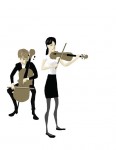Students in UCLA Camarades don’t only learn from their professors during lectures – they also get to make music with them on stage.
Tonight, a mixture of undergraduate and graduate students from the UCLA Herb Alpert School of Music’s string program will show audiences what they have been working on over the last several weeks during the Camarades’ quarterly concert at the Jan Popper Theater.
Cello professor Antonio Lysy said the string department chose the name Camarades because it relates to the chamber music that the group plays as well as the relationship between instructors and students.
“It sounds like comrades, but we didn’t want to use that,” Lysy said. “It’s mainly to say that we are colleagues and friends in playing music together, and not so much professors and students.”
The Camarades ensemble performs in various settings in addition to these quarterly performances. Since its founding in 2009, the group has performed in the Los Angeles area and at two international music festivals in Tuscany, Italy and Yerevan, Armenia in the summer of 2012.
Movses Pogossian, violin professor and chair of strings, said the most unusual aspect of the Camarades program in general is that students get to perform with their professors, though tonight’s quarterly performance will feature only chamber music ensemble students.
Pogossian said this concert will feature performances by ten to twelve groups of students, with two to six students in each group. He said they will play a combination of music from Beethoven to the work of contemporary composer David Anderson.
This particular performance will feature mostly string instruments, including violin, viola, cello and bass, accompanied by a piano.
Mira Khomik, a violinist and second-year graduate student pursuing a doctorate in musical arts, said Camarades was one of the most attractive things she discovered when she first began researching the UCLA string chamber music program. She has performed in every quarterly event since she began her graduate studies last year.
“Each performance is always different,” Khomik said. “But when you perform in a group, it’s even more interesting because you play off of each other.”
Tonight, Khomik and the string quartet will play the fourth and fifth movements of Beethoven’s Quartet in A minor, Op. 132.
Lysy said tonight’s concert marks the culmination of many hours of rehearsal and collaboration, and the students in the chamber music ensemble class will be graded based on their preparation as well as on tonight’s performance.
In preparation for this concert, Pogossian said students are placed in groups and rehearse together and with their professors.
“We assign those groups to the students, and they have a certain responsibility within the groups to work themselves,” Pogossian said. “We also see them for coaching and instruction on a weekly basis. That’s how we do the preparation.”
Khomik said her group’s rehearsals have been focused on creating the right dynamic for this string performance.
“It is important for all of the groups to get to know each other’s playing style and to play together as much as possible so they can … find the right interpretation of the piece,” Khomik said.
Pogossian said one of the biggest challenges in organizing a chamber group performance is figuring out how to balance all of the instruments to create a cohesive sound.
“Unlike an orchestra, which is so big and has a clear boss, the conductor, a chamber group is more like a family,” Pogossian said. “It’s a group of equals, and every decision has to be made jointly and voluntarily. Therefore, a question of feeling is very important in a chamber group.”
Despite the challenges of coordinating a chamber group performance, Khomik said what she most enjoys about being a part of Camarades is being able to develop as a musician.
“Chamber music is my passion, so I always wanted to be as involved in it as possible,” Khomik said. “I try to play in string quartets as much as I can, and we’re working very seriously on this year’s program.”

Hi, Andrea,
It’s a common misconception, but you’ve misrepresented the role of the pianist in chamber music. The piano does not ever merely “accompany.” It is a full musical partner that’s as important as any or all of the other instruments in the ensemble! As Prof. Pogossian said, a chamber group is a “group of equals”.